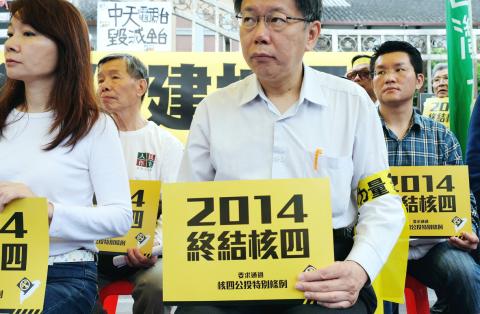Taiwan Power Co (Taipower, 台電) yesterday said the public should consider the possibility of electricity rates being hiked if the Fourth Nuclear Power Plant does not go online.
The comment came in response to former Democratic Progressive Party (DPP) chairman Lin Yi-xiong (林義雄) beginning a hunger strike in Taipei yesterday to protest against the completion of the plant in New Taipei City’s Gongliao District (貢寮) and to encourage the government to recognize that the public is opposed to the plant.
Lin, 72, began his hunger strike at the Gikong Presbyterian Church (義光教會) on Xinyi Road.

Photo: Sam Yeh, AFP
“We respect Mr Lin’s dedication to pushing the government to implement a specific energy policy [to halt construction of the plant], and that is all I can say,” Taipower vice president Roger Lee (李鴻洲) told reporters on the sidelines of a corporate event.
As the supervisor of the plant’s construction, Taipower welcomes the public to express their support or dissent for the Fourth Nuclear Power Plant and nuclear energy, Lee said.
However, one should consider whether there is need to complete construction of the plant from more than one perspective, and people may be required to pay more for non-nuclear plant generated electricity, Lee said.
Taipower plans to finish its security test at the controversial plant by the end of June, as scheduled by the Ministry of Economic Affairs, and will let the government decide whether to install the fuel rods in accordance with its energy policies afterward, he said.
Wu Yu-jen (吳玉珍), a spokesperson for the ministry’s task force on the plant, said Taiwan would face power shortages if the Fourth Nuclear Power Plant does not become operational, since the three operating plants — Jinshan Nuclear Power Plant in Shihmen District (石門) and Guosheng Nuclear Power Plant in Wanli District (萬里) of New Taipei City and Ma-anshan Nuclear Power Plant in Ma-anshan (馬鞍山), Pingtung County — are scheduled to be retired by 2025.
Despite the generation of electricity from alternative energy sources, electricity shortages would remain an issue and would have a considerable impact on households as well as businesses, she said by telephone.
“The shortage issue would only get worse, especially in northern Taiwan,” Wu said.
Taipei uses up to 40 percent of the total electricity generated annually by Taipower nationwide because of its large population.
Taipei residents might face power restrictions sooner than expected, as the Linkou coal-fired power plant in New Taipei City and the Hsieh-ho coal-fired power plant in Keelung are scheduled to be shut down this year.
If the three operating nuclear power plants retired as scheduled in 2025, the country’s total electricity supplies would drop by 40 billion kilowatts a year, if Fourth Nuclear Power Plant was not completed, which would leave up to 90 percent of household demand for electricity unmet, Wu said.

Nvidia Corp chief executive officer Jensen Huang (黃仁勳) on Monday introduced the company’s latest supercomputer platform, featuring six new chips made by Taiwan Semiconductor Manufacturing Co (TSMC, 台積電), saying that it is now “in full production.” “If Vera Rubin is going to be in time for this year, it must be in production by now, and so, today I can tell you that Vera Rubin is in full production,” Huang said during his keynote speech at CES in Las Vegas. The rollout of six concurrent chips for Vera Rubin — the company’s next-generation artificial intelligence (AI) computing platform — marks a strategic

REVENUE PERFORMANCE: Cloud and network products, and electronic components saw strong increases, while smart consumer electronics and computing products fell Hon Hai Precision Industry Co (鴻海精密) yesterday posted 26.51 percent quarterly growth in revenue for last quarter to NT$2.6 trillion (US$82.44 billion), the strongest on record for the period and above expectations, but the company forecast a slight revenue dip this quarter due to seasonal factors. On an annual basis, revenue last quarter grew 22.07 percent, the company said. Analysts on average estimated about NT$2.4 trillion increase. Hon Hai, which assembles servers for Nvidia Corp and iPhones for Apple Inc, is expanding its capacity in the US, adding artificial intelligence (AI) server production in Wisconsin and Texas, where it operates established campuses. This

Garment maker Makalot Industrial Co (聚陽) yesterday reported lower-than-expected fourth-quarter revenue of NT$7.93 billion (US$251.44 million), down 9.48 percent from NT$8.76 billion a year earlier. On a quarterly basis, revenue fell 10.83 percent from NT$8.89 billion, company data showed. The figure was also lower than market expectations of NT$8.05 billion, according to data compiled by Yuanta Securities Investment and Consulting Co (元大投顧), which had projected NT$8.22 billion. Makalot’s revenue this quarter would likely increase by a mid-teens percentage as the industry is entering its high season, Yuanta said. Overall, Makalot’s revenue last year totaled NT$34.43 billion, down 3.08 percent from its record NT$35.52

PRECEDENTED TIMES: In news that surely does not shock, AI and tech exports drove a banner for exports last year as Taiwan’s economic growth experienced a flood tide Taiwan’s exports delivered a blockbuster finish to last year with last month’s shipments rising at the second-highest pace on record as demand for artificial intelligence (AI) hardware and advanced computing remained strong, the Ministry of Finance said yesterday. Exports surged 43.4 percent from a year earlier to US$62.48 billion last month, extending growth to 26 consecutive months. Imports climbed 14.9 percent to US$43.04 billion, the second-highest monthly level historically, resulting in a trade surplus of US$19.43 billion — more than double that of the year before. Department of Statistics Director-General Beatrice Tsai (蔡美娜) described the performance as “surprisingly outstanding,” forecasting export growth